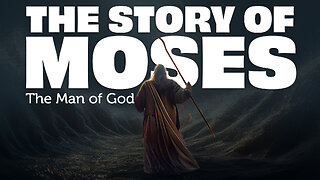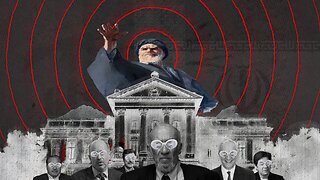Premium Only Content

Episode 2296: The Paradox of the Cross - Nightly Episode
“O my God, at the end of this day I thank You most heartily for all the graces I have received from You. I am sorry that I have not made better use of them. I am sorry for all the sins I have committed against You. Forgive me, O my God, and graciously protect me this night. Blessed Virgin Mary, my dear heavenly mother, take me under your protection. St. Joseph, my dear Guardian Angel, and all you saints in heaven, pray for me. Sweet Jesus, have pity on all poor sinners, and save them from hell. Have mercy on the suffering souls in purgatory. Amen”
The Paradox of the Cross
Introduction:
In tonight’s episode, we will reflect on the patience of God, the Christian’s preparation for death, and the paradox of Christ’s trial and crucifixion. Our journey is guided by the words of St. Maria Goretti, St. Irenaeus of Lyons, Fulton Sheen, and the Psalms. Let’s delve deeper into these themes from a traditional Catholic perspective and uncover their significance in our spiritual journey.
"He loves, He hopes, He waits. Our Lord prefers to wait Himself for the sinner for years rather than keep us waiting an instant." — St. Maria Goretti
St. Maria Goretti’s words highlight the infinite patience and mercy of God towards sinners.
• God’s Love: The phrase "He loves" emphasizes that the foundation of God’s patience is His profound love for each of us. Despite our sins and failures, His love remains steadfast and unconditional.
• God’s Hope: "He hopes" indicates that God sees the potential for redemption in every soul. He never gives up on us but continually hopes for our return to Him.
• God’s Patience: "He waits" reflects the extraordinary patience of God. Unlike humans, who often become impatient and frustrated, God waits for years, allowing us the time we need to repent and return to Him.
• Application in Daily Life: We can draw comfort and inspiration from God’s patience. It encourages us to persevere in our spiritual journey, knowing that God is always ready to welcome us back with open arms, no matter how long it takes.
"The business of the Christian is nothing else but to be ever preparing for death." — St. Irenaeus of Lyons
St. Irenaeus of Lyons reminds us of the central focus of the Christian life: preparation for death and eternal life.
• Eternal Perspective: This quote calls us to live with an eternal perspective, recognizing that our earthly life is temporary and that we should always be ready for our passage into the next life.
• Daily Preparation: Preparing for death means living each day in a state of grace, through regular confession, prayer, and adherence to God’s commandments. It involves cultivating virtues and detaching from worldly attachments.
• Spiritual Readiness: Being ever prepared for death ensures that we are ready to meet our Creator at any moment. This readiness brings peace and a sense of purpose to our lives, as we align our actions with our ultimate goal of union with God.
• Application in Daily Life: We can incorporate this teaching by regularly examining our conscience, making use of the sacraments, and living each day as if it were our last, always striving to grow in holiness and virtue.
"Our Blessed Lord had two natures: Divine and human. Both were on trial and on totally different charges. Thus was fulfilled the prophecy of Simeon that He was a 'sign to be contradicted.' The judges could not agree as to why He should die; they could only agree that He must. The religious judges, Anna and Caiaphas, found Him guilty of being too Divine; the political judges, Pilate and Herod, found Him guilty of being too human. Before the one, He was too unworldly; before the other, too earthly. From that day on, His Church too would be condemned on contradictory charges, either for claiming to be too divine by some, or else for being too human by others. Condemned on contradictory charges, He was sentenced to the symbol of contradiction, which is the Cross." — Fulton Sheen
Fulton Sheen’s reflection on the trial and crucifixion of Jesus highlights the paradox of His dual nature and the contradictions He faced.
• Dual Nature of Christ: Jesus, fully divine and fully human, was misunderstood and condemned for both His divinity and humanity. This dual nature is a central tenet of our faith, emphasizing that Jesus is the bridge between God and man.
• Contradictory Charges: The contradictory accusations against Jesus illustrate the world’s inability to comprehend His true nature. His divinity was seen as blasphemy by religious authorities, while His humanity was perceived as a threat by political powers.
• Symbol of the Cross: The Cross, a symbol of contradiction, represents the culmination of these misunderstandings. It stands as a testament to the paradox of Jesus’ mission: through His suffering and death, He brought salvation and life.
• Application in Daily Life: We can embrace the paradoxes in our own lives, recognizing that following Christ often means facing misunderstandings and contradictions. By accepting our own crosses, we participate in the redemptive mystery of Jesus.
Scripture Reading: "He determines the number of the stars, He gives to all of them their names." — Psalm 147:4
Psalm 147:4 speaks of God’s omniscience and the intimate care He has for His creation.
• God’s Sovereignty: The verse highlights God’s supreme authority and knowledge. He not only created the stars but also knows each one by name, signifying His detailed and personal involvement in creation.
• Intimate Care: This intimate knowledge extends to each of us. Just as He knows the stars, He knows each of us personally and cares for us deeply.
• Divine Order: The order and precision with which God governs the universe reflect His wisdom and power. This can give us confidence in His providential care for our lives.
• Application in Daily Life: We can trust in God’s care and sovereignty, knowing that He is deeply involved in every aspect of our lives. This trust can bring us peace and assurance, even amidst the uncertainties of life.
Conclusion:
As we conclude tonight’s episode, let us reflect on the profound truths we have explored. St. Maria Goretti reminds us of God’s boundless patience and mercy, encouraging us to return to Him no matter how long we have strayed. St. Irenaeus of Lyons calls us to live with an eternal perspective, always preparing for our ultimate journey to God. Fulton Sheen’s reflection on Christ’s trial and crucifixion challenges us to embrace the paradoxes and contradictions we face in our own lives, seeing them as part of our participation in the mystery of the Cross. Finally, Psalm 147 reassures us of God’s intimate knowledge and care for each of us, inviting us to trust in His providential love.
Thank you for joining us tonight and may you find strength in God’s patience, peace in preparing for eternity, and courage in embracing the paradoxes of the Christian life. Until next time, may your journey be blessed with grace and your path illuminated by faith. God bless
-
 8:33
8:33
scoutthedoggie
3 hours agoAirsoft War Games Scotland
7.58K1 -
 4:56
4:56
Kirill MultitoolOfficial
1 day ago $0.67 earnedSurvival TIPS and usefull bushcraft DIY in the wild
15K3 -
 27:25
27:25
ArturRehi
1 day agoThis is How Dictatorships are Formed
8.13K1 -
 59:35
59:35
AlaskanBallistics
16 hours ago $0.28 earnedI Love this Gun Episode # 11
6.19K1 -
 1:21:01
1:21:01
BibleUnbound
18 hours agoThe Complete Story of Moses: The Man of God
12.8K3 -
 15:56
15:56
Chris From The 740
6 hours ago $0.01 earnedFenix LR36R Review: The Most Powerful Light I've Ever Tested!
6.9K1 -
 1:01:47
1:01:47
Wendy Bell Radio
8 hours agoPet Talk With The Pet Doc
14.6K6 -
 2:23:45
2:23:45
Game On!
18 hours ago $9.90 earnedTom Brady approves of President Trump calling out Governors wanting men in women's sports!
50.1K8 -
 5:34
5:34
BIG NEM
16 hours agoFrom Atheist to Seeing Auras: My Unlikely Spiritual Awakening 🤯
3.01K1 -
 15:32
15:32
Good Kid Productions
4 days agoHow Iran Pimps Princeton (mini-doc)
2.67K1